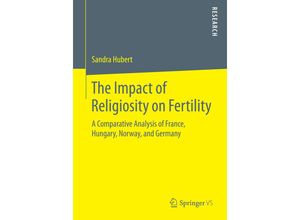The work investigates the impact of religiosity of women and men on their completed fertility
in an international comparison considering a long time period. Sandra Hubert aims at uncovering
all mechanisms through which religiosity and religious institutions can affect fertility. Hence
both the micro- and the macro-level of each country are explicitly integrated and
theoretically as well as empirically dealt with. The selection of differing countries rests
upon the expectation that religiosity influences fertility decisions independently of the
institutional context social norms state church-relations and the national degree of
religious vitality. These factors are intensively compared with each other at the country
level. At the micro-level the impact of religiosity on fertility is tested by means of
regressions and based on the Generations and Gender Survey. Results depend on gender country
the diverse religious affiliations and more.



